Responsibilities of High-Experience First Officers in Aviation
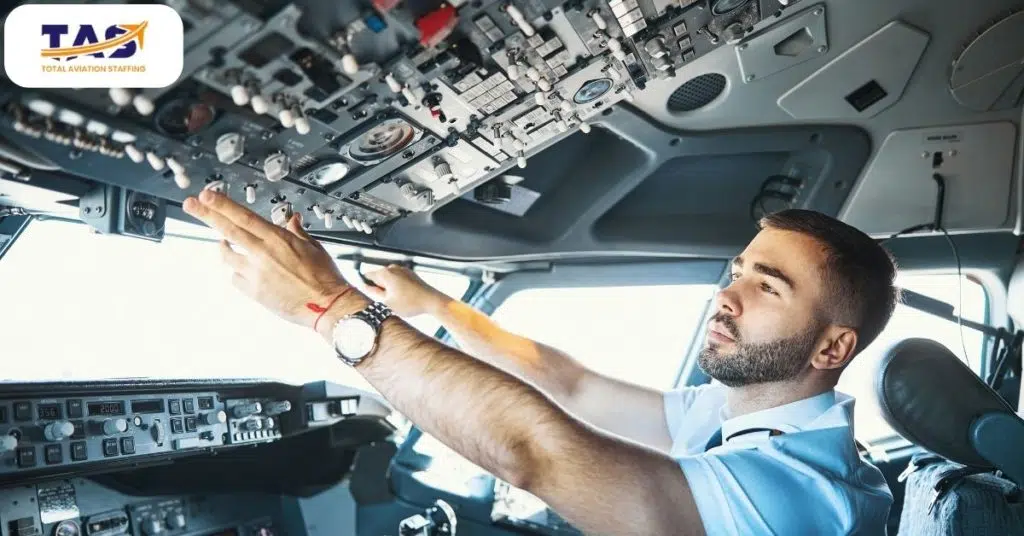
Are you a skilled aviator seeking the next thrilling chapter in your career? Look no further! Explore the exceptional responsibilities entrusted to High-Experience First Officers and delve into the world of aviation excellence. From pre-flight preparations to flight deck operations and decision-making prowess, join us as we unravel the captivating journey of First Officers in the skies.
Discover why this coveted role offers unparalleled growth opportunities, lucrative compensation, and stability, making it the ultimate career path in commercial aviation. Don’t miss out on this chance to soar to new heights as a High-Experience First Officer!
1. Pre-flight Preparation
First Officers are essential in guaranteeing the success of pre-flight preparations, which are vital in aviation. Their involvement is critical for ensuring a smooth and safe flight experience.
These are the responsibilities of First Officers when it comes to pre-flight preparation:
Conduct thorough pre-flight inspections, checking aircraft systems and components for proper functioning.
Review weather conditions, including forecasts and reports, to assess potential flight hazards.
Ensure that all required documents, such as flight plans and manuals, are accurate and up-to-date.
Coordinate with ground personnel to ensure the availability of necessary equipment and resources.
Verify weight and balance calculations to ensure the aircraft is properly loaded and within limits.
Communicate and coordinate with air traffic control to obtain necessary clearances and instructions.
Brief the flight crew on important information, including emergency procedures and flight details.
Cross-check instruments and avionics to ensure accurate readings and functionality.
So remember, when it comes to pre-flight preparations, First Officers take the lead like expert conductors, orchestrating a symphony of safety and efficiency. From meticulous inspections to weather wizardry, they ensure your flight soars high with smoothness and style.
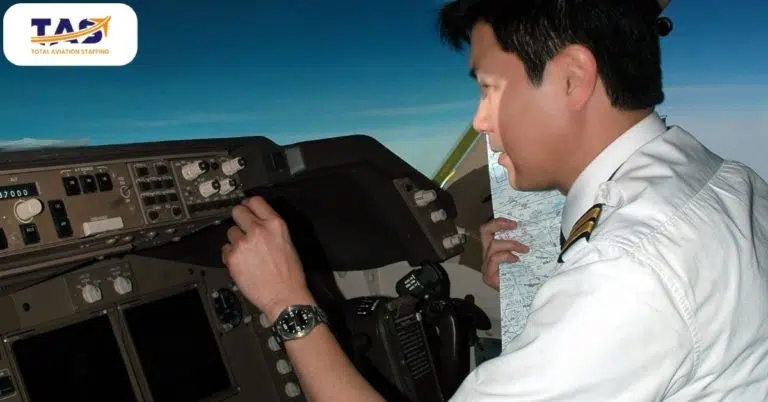
2. Flight Deck Operations
Close collaboration between First Officers and Captains is crucial for the safe and efficient operation of flight deck operations. Their combined expertise and teamwork create a seamless experience, ensuring the aircraft navigates the skies with utmost precision and confidence.
Here are their responsibilities when it comes to flight deck operations:
Monitor and interpret aircraft instruments to ensure accurate flight data and system functionality.
Communicate with air traffic control to receive and relay important instructions and clearances.
Perform navigational calculations and monitor the aircraft’s position using navigation aids and charts.
Manage and configure the autopilot and other flight systems as directed by the Captain.
Collaborate with the Captain in decision-making processes, including route adjustments and weather diversions.
Assist in monitoring and managing fuel consumption to maintain optimum performance and range.
Monitor and respond to system alerts or abnormal conditions, implementing appropriate procedures.
Communicate and coordinate with the cabin crew to ensure passenger safety and comfort.
In the dynamic realm of flight deck operations, First Officers and Captains join forces like a skilled symphony, conducting safety and efficiency with precise teamwork. From instrument finesse to navigational prowess, they ensure your flight soars smoothly, leaving you on cloud nine.
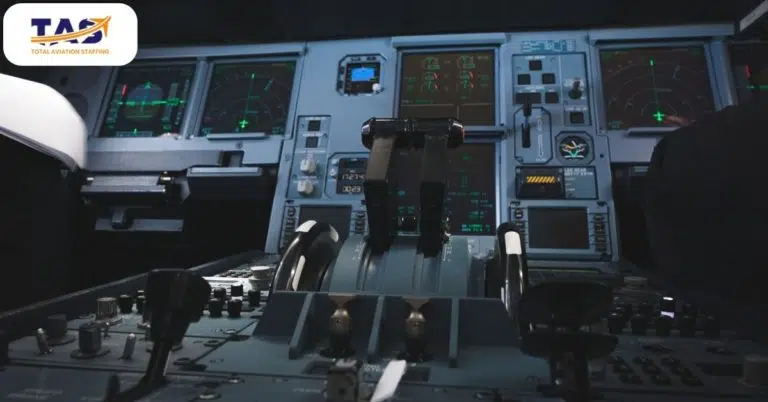
3. Decision Making
In-flight deck operations, First Officers are entrusted with effective decision-making, drawing upon their experience, knowledge, and adherence to standard operating procedures. Their sound judgment navigates the skies, ensuring safe and efficient flights with finesse.
Having strong decision-making skills is crucial for a First Officer in aviation due to several important aspects:
Safety: The foremost priority in aviation is the safety of passengers, crew, and aircraft. A First Officer’s ability to make sound decisions based on available information and experience helps mitigate risks and ensure safe flight operations.
Emergency Situations: In critical situations such as engine failures, severe weather, or other emergencies, quick and effective decision-making is essential. First Officers must assess the situation, follow established procedures, and make timely decisions to ensure the best possible outcome.
Risk Management: Aviation involves inherent risks, and First Officers must assess and manage those risks effectively. By making informed decisions and considering factors like weather, fuel, and aircraft performance, they can mitigate risks and make flights safer.
Adherence to Standard Operating Procedures: First Officers must follow standard operating procedures (SOPs) to maintain consistency and ensure operational efficiency. By making decisions aligned with SOPs, they contribute to smooth operations and minimize errors.
Customer Service: While safety is paramount, providing a positive customer experience is also important. First Officers may need to make decisions that balance safety considerations with passenger comfort and satisfaction.
In the high-flying realm of decision-making, First Officers soar with expertise, wit, and finesse. With safety as their compass and customer service as their co-pilot, they navigate the skies, leaving passengers in awe.
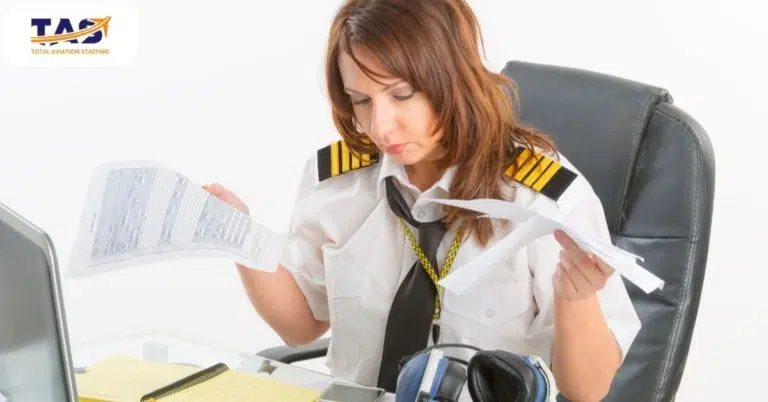
4. Communication and Teamwork
In the aviation realm, effective communication and teamwork form the wings that carry First Officers to collaboration, safety, and efficient operations. Through seamless coordination, they soar together, ensuring a smooth and successful flight experience.
Here are the effects of having a great First Officer with exceptional communication and teamwork skills.
Collaborative Decision Making: Communication and teamwork enable First Officers to collaborate with the Captain and crew in making informed decisions.
Crew Resource Management: Effective communication fosters a positive working environment and enhances coordination among the flight crew.
Safety and Emergency Response: Clear and concise communication during emergencies ensures efficient execution of emergency procedures.
Operational Efficiency: Effective communication streamlines workflow, facilitates task delegation, and enhances overall operational efficiency.
Air Traffic Control Interactions: Clear communication with air traffic control ensures the accurate transmission of instructions and information.
Cabin Crew Coordination: First Officers collaborate with the cabin crew to maintain passenger safety and facilitate smooth operations.
Conflict Resolution: Good communication and teamwork skills help resolve conflicts and maintain harmonious working relationships.
Passenger Communication: First Officers communicate with passengers during pre-flight briefings and provide updates during the flight.
As First Officers harness the power of communication and teamwork, they take flight with unrivaled finesse. From collaborative skies to harmonious cabins, their skills ensure a journey where safety, efficiency, and smiles interlace.
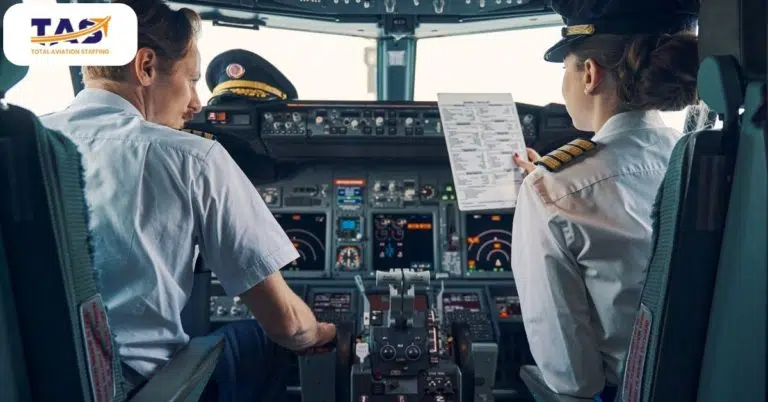
5. Emergency Procedures
First Officers in aviation must possess proficiency in emergency procedures to effectively respond during critical situations. Their readiness ensures swift and effective action when it matters most, securing the safety of all on board.
Here are the responsibilities of First Officers when it comes to emergency procedures:
Swift Response: First Officers must react promptly and decisively when faced with emergencies such as engine failures, fires, and severe weather conditions.
Follow Established Procedures: They adhere to established emergency procedures and protocols to ensure a standardized and systematic response.
Communication and Coordination: First Officers communicate with the Captain and crew, sharing critical information and coordinating actions for a cohesive response.
Passengers and Cabin Crew: They assist in managing the safety and well-being of passengers and collaborate with the cabin crew during emergencies.
Decision Making: First Officers assess the situation, gather information, and make quick yet informed decisions to mitigate risks and ensure the best possible outcome.
Training and Simulations: They undergo regular training and simulations to practice and maintain proficiency in emergency procedures.
Equipment and Systems: First Officers are responsible for effectively utilizing emergency equipment and systems on board the aircraft.
Post-Emergency Reports: After an emergency, they provide accurate and detailed reports, contributing to incident analysis and improvement of procedures.
With proficiency in emergency procedures, First Officers embrace the unexpected, turning crisis into triumph. From swift responses to coordinated actions, they navigate turbulence with calm finesse, ensuring safety soars high.
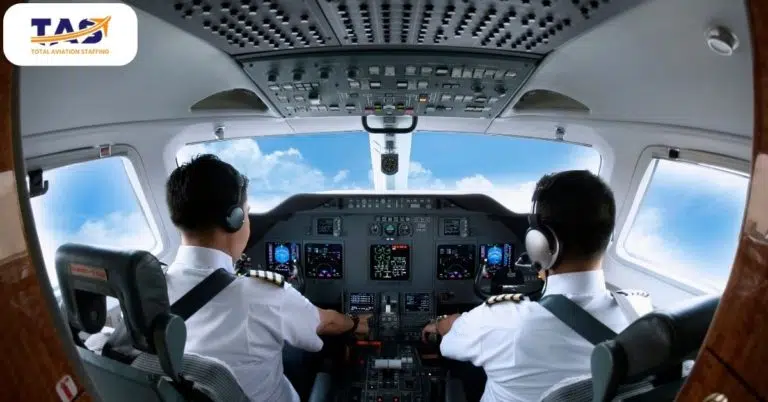
6. Monitoring and Systems Management
First Officers in aviation play crucial roles in monitoring and managing aircraft systems, ensuring their smooth operation. Their vigilance guarantees a seamless flight experience by keeping the technological heartbeat of the aircraft in perfect rhythm.
Here is the elaboration of the roles of First Officers in monitoring and systems management:
Instrument Monitoring: First Officers continuously monitor aircraft instruments to ensure accurate readings and system functionality.
System Health Assessment: They assess the health and performance of various aircraft systems, including engines, hydraulics, and electrical systems.
Alert Response: First Officers promptly respond to system alerts and abnormal conditions, following appropriate procedures for troubleshooting and resolution.
Fuel Management: They monitor fuel consumption and ensure efficient usage to maintain optimal performance and range.
Data Analysis: First Officers analyze data from aircraft systems to identify trends, and potential issues, and improve system performance.
Autopilot and Flight Systems: They manage the autopilot and other flight systems, configuring settings as per operational requirements.
Checklist Execution: First Officers ensure the completion of checklists, verifying the proper functioning of critical systems before and during flights.
Communication with Maintenance: They communicate system-related issues to maintenance personnel for timely resolution and preventive measures.
As First Officers harmonize with the symphony of aircraft systems, they ensure a melodious flight experience. From vigilant monitoring to troubleshooting finesse, they keep the technological beats grooving. So buckle up and enjoy the seamless journey ahead, orchestrated by their mastery of the skies!
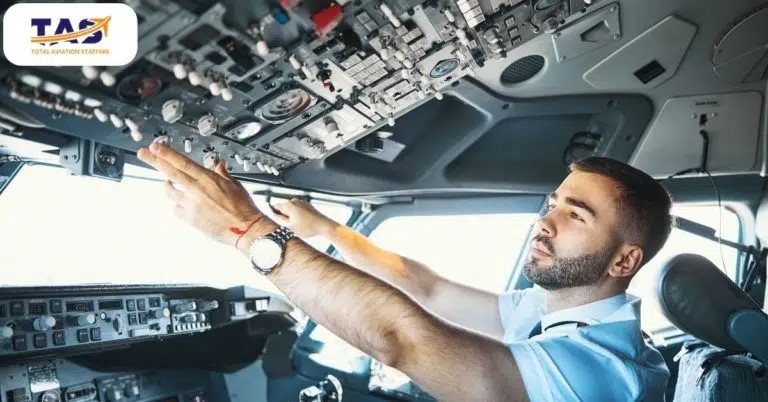
7. Crew Resource Management
Crew Resource Management (CRM) is a vital aspect of aviation, and First Officers are key players in its implementation. Through their essential roles, they ensure effective teamwork and communication, fostering a harmonious and safe operational environment.
Here are the roles of First Officers in Crew Resource Management (CRM):
Effective Communication: First Officers promote open and clear communication among the flight crew, fostering a collaborative environment.
Situational Awareness: They actively contribute to maintaining situational awareness, and sharing relevant information with the Captain and crew.
Decision Making: First Officers participate in collaborative decision-making processes, considering inputs from the crew for informed choices.
Task Management: They assist in task delegation and management, ensuring efficient utilization of crew resources and workload distribution.
Conflict Resolution: First Officers help identify and resolve conflicts or misunderstandings among the crew, promoting teamwork and harmony.
Leadership Support: They provide support to the Captain in leading the crew, contributing to a positive and cohesive team dynamic.
Error Management: First Officers actively participate in error identification, reporting, and implementing corrective measures for continuous improvement.
Stress Management: They recognize and address crew fatigue, stress, or distractions, maintaining a focused and alert team environment.
As First Officers soar through the clouds, their collaboration becomes the ultimate choreography of the skies. With communication as their melody, teamwork as their rhythm, and safety as their guiding star, they create an aerial symphony that leaves passengers in awe.
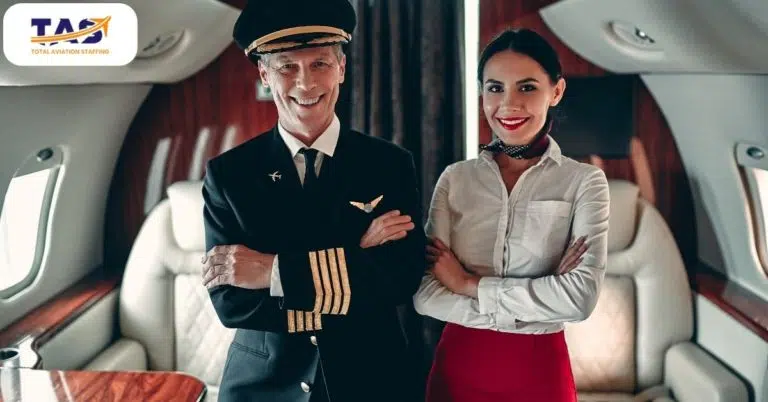
Wrapping Up
The responsibilities of High-Experience First Officers in aviation are not for the faint-hearted but for those craving adventure and challenge. From pre-flight preparations to mastering flight deck operations, these sky conquerors are the unsung heroes of the aviation world. With their decision-making prowess and exceptional teamwork, they ensure the safe and smooth journey of every flight. So, if you’re ready to navigate the skies, join the ranks of High-Experience First Officers and let your career take off to extraordinary heights!
Ready to take flight? Don’t wait! Discover your dream aviation job with Total Aviation Staffing. We connect you with top companies in the industry, from MROs and OEMs to airlines and charter companies. Whether you’re an A&P mechanic, aircraft technician, flight attendant, or interested in aviation customer service, we’ll help you soar to new heights. Let us enhance your career and support you in finding the perfect role. Don’t miss out on this opportunity. Visit our website and start your journey to a fulfilling aviation career today!
